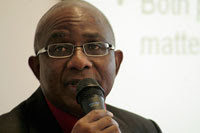 By Katharina Welle, STEPS Centre PhD student
By Katharina Welle, STEPS Centre PhD student
The New Manifesto, presented by Adrian Ely on day one of the STEPS Centre Symposium, argues for three crucial shifts in thinking about innovation for development and sustainability: directions, diversity and distribution. But, how can these conceptual arguments be applied to address the realities faced by poor people today? Photo: Banji Oyelaran-Oyeyinka by Lance Bellers
In a nutshell, the 3-D agenda argues for:
Directionality – moving away from a linear, uni-directional and dominant model of progress towards recognising that alternative directions may be relevant depending on the context.
Distribution – shifting focus towards innovations that address the concerns of the poor rather than those of the rich.
Diversity – upholding a diversity of knowledges from which to innovate.
In his response to this agenda, Oyebanji Oyeyinka, UN-Habitat, argued that there is a disconnect between current innovation debates and the big UN agendas of alleviating poverty i.e. the Millennium Development Goals. Innovation, according to him, is largely glossed over in the MDGs although science and technology advances bear important challenges and opportunities towards achieving poverty reduction that need to be reflected upon.
This is clear in Tanzania, where the Ministry of Water and Irrigation is currently holding its yearly sector review. The new and exciting innovation in the sector is the use of mobile phone technology to report non-functional water points. In many countries of Sub-saharan Africa, the average non-functionality rate of water points is around 30% thus substantially reducing access to water to prospective users.
However, follow-up has been very poor in many countries, not last (but not only) because of a communication breakdown between water point committees and district water officers and failures in reporting non-functionality upwards in the sector. Now, the ministry intends to remedy this by equipping district water officers with mobile phones that allow them to directly report the status of water points to a centralised government database. At the same time, citizens will be able to text (hopefully toll-free) reports of non-functional water points to a publicly available and independent website.
While the technical side of this innovation is very exciting, there are many open questions with regard to directionality and distribution – who will benefit and how is not clear. For example, what implications arise for local level governance when water officers and citizens alike text failure reports to a website and a central data base? Will this have positive or negative implications for the downward accountability of district water officers and the district government? Who will respond to a text coming from a rural area somewhere in Tanzania? Will there be a polite customer reply like “Thank you, we have received your report and will deal with it in due course”? In a nutshell – is this innovation debilitating or strengthening government accountability for service provision in Tanzania?
It is these kinds of issues that the New Manifesto ought to be able to address. Its success depends on whether it is able to engage with debates surrounding the new, exciting innovations occurring in countries like Tanzania today.